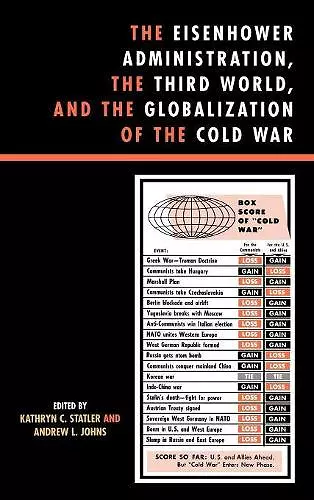The Eisenhower Administration, the Third World, and the Globalization of the Cold War
Andrew L Johns editor Kathryn C Statler editor
Format:Hardback
Publisher:Rowman & Littlefield
Published:2nd Jun '06
Currently unavailable, and unfortunately no date known when it will be back

In the United States, the Cold War is often remembered as a two-power struggle. However, increasing globalization during that time meant nations across the world became involved in the conflict. During the Eisenhower administration, American officials struggled to respond to the dual threats of communism and nationalism as decolonization swept through the Third World during the 1950s and changed the nature of the Cold War and U.S. foreign relations with those nations. As the Cold War increasingly became a zero-sum game, the Third World became the primary battleground in the ideological, economic, and political struggle between Washington and Moscow. Indeed, as these essays demonstrate, the Eisenhower administration placed an extremely high priority on victory in the Third World and seemed willing to go to virtually any length to ensure that countries in Africa, Asia, the Middle East, and the Americas remained aligned with the forces of democracy and capitalism. Relying on formerly unavailable archival research from many nations, the scholars in this volume systematically assess the impact of the globalizing Cold War and the process of decolonization on the Eisenhower administration's foreign policy. Intended for diplomatic historians and readers interested in the Cold War, this book is a major contribution to an under-studied aspect of that conflict. Contributions by: Michael R. Adamson, David L. Anderson, Nathan J. Citino, Peter L. Hahn, Andrew L. Johns, Robert J. McMahon, James H. Meriwether, Kenneth A. Osgood, Chester J. Pach Jr., Jason C. Parker, John Prados, James F. Siekmeier, Kathryn C. Statler, and Yi Sun
The excellent essays in The Eisenhower Administration, the Third World, and the Globalization of the Cold War demonstrate the importance of the Third World to the Eisenhower administration's overall Cold War strategy and the significance of Third World actors and events for understanding the changing dynamics of the Cold War in the 1950s. Based on extensive research in U.S. and foreign archives, this work represents the best of the new international history and is essential reading for anyone who wishes to understand U.S. policies toward the Third World at this critical juncture of the Cold War. -- David F. Schmitz, Whitman College
Recent events have made all too clear the necessity of understanding the complicated, often vexed relationship between the United States and the Third World. In this superb new collection, leading historians of American foreign relations explore one of the most crucial phases in the development of that relationship—years when U.S. policymakers fully confronted the difficulty of promoting self-determination while fighting radicalism around the world. This book is essential reading for scholars of the Cold War and American diplomacy. -- Mark A. Lawrence, University of Texas at Austin; author of The Vietnam War: A Concise International History
Carefully researched and remarkable comprehensive collection of essays. . . . This volume provides an excellent survey of a complex and important period, and it admirably shows the degree to which the Eisenhower administration tried, and failed, to respond to the global forces of anti-colonial nationalism. -- Michael E. Latham
Statler and Johns restore decolonization to the top of the Cold War agenda, where Eisenhower pegged it. This rich account is a must-read for anyone interested in how Third World actors shaped events, or how America's anti-colonial conscience warred with its anxiety to contain communism. -- Elizabeth Cobbs Hoffman, San Diego State University
ISBN: 9780742553811
Dimensions: 242mm x 166mm x 26mm
Weight: 630g
326 pages